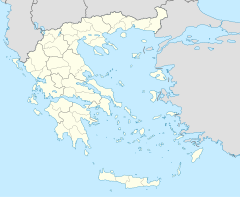| This article includes a list of general references, but it lacks sufficient corresponding inline citations. Please help to improve this article by introducing more precise citations. (February 2022) (Learn how and when to remove this message) |
| Mosque of Athens | |
|---|---|
| Τζαμί της Αθήνας | |
 | |
| Religion | |
| Affiliation | Islam |
| Ownership | Government of Greece |
| Status | Open to public |
| Location | |
| Location | Votanikos, Athens, Greece |
   | |
| Geographic coordinates | 37°59′10″N 23°42′00″E / 37.986°N 23.7°E / 37.986; 23.7 |
| Architecture | |
| Type | Mosque |
| Funded by | Government of Greece |
| Date established | 3 November 2020 |
| Capacity | 366 people |
The Mosque Of Athens (Greek: Ισλαμικό Τέμενος Αθηνών, romanized: Islamiko Temenos Athinon) or Athens Mosque (Greek: Τζαμί της Αθήνας, romanized: Tzami tis Athinas, lit. 'Athens Mosque') is a mosque in the Votanikos neighbourhood of Athens, Greece. It is the first official mosque in the Greek capital since the Greek War of Independence. Athens was the only European capital without a mosque until its construction. The project faced opposition from the Greek Orthodox Church and civil protests.
History
There are mosques from the Ottoman times in Athens, such as the Tzistarakis Mosque and the Fethiye Mosque, but they function solely as archaeological monuments. Until 2014, only Orthodox Christianity, Judaism, and Islam in some areas of Greece were legally allowed to open places of worship. While there was no official mosque near Athens, more than a hundred makeshift mosques formed in the area. As of November 2020, ten have been given permission by the Greek government to continue operating but the others face being moved or shut down.
The first law passed by the Greek Parliament about constructing a ″Turkish mosque″ in the Athens area was in 1890. In 1970, conservative Arab countries offered the funding of a mosque in Athens but neither the law nor the proposal were realized. Increased immigration from Muslim countries in recent decades has made the establishment more urgent—about 200,000 Muslims live in the Athens area, many of whom are Pakistani but until recently there was no official mosque building.
The first attempt to establish a mosque in Athens dates to Law 2833 in 2000 which envisaged its establishment at Hourmouza in Paiania and was intended to be financed by Saudi Arabia. Due to the reaction of the Church and the locals, the project stalled. In 2006, the effort was resumed with Law 3512 but with major modifications: it was decided that the construction would be financed solely by the Greek state which would retain complete control over the mosque and appoint its imam. The project was repeatedly delayed due to judicial actions by various groups- which went all the way to the Council of State-and the fact that four successive public tenders received no interest from contractors.
Construction
The fifth tender was successful and given to a consortium comprising four of Greece's biggest construction firms—J&P ABAX, TERNA, AKTOR, and Intrakat. The contract for the construction was signed on 10 October 2016. The location had to be cleared by the police first, as it was occupied by far-right protesters, but construction began on 4 November. The site, with a total surface of 17 stremmata, was handed over by the Hellenic Navy. Existing structures were torn down for the building of a new complex, planned to include a parking space and children's playground. The mosque was planned to have an area of 1,000 m and comprise two areas of worship, one for men with a capacity for 500, and one for women, with a capacity of 50. The mosque was not planned to feature a minaret. The mosque was financed by the Greek state, without any outside financial support; it is the only mosque in a European capital built solely using government funds. The budget was 887,000 euros.
Opening
The mosque was opened on 3 November 2020. The opening was delayed due to the COVID-19 pandemic. Its first and current imam is Zaki Mohammed.
See also
References
- ^ Ioannou, Demetrios (8 November 2020). "Athens's first mosque since the 19th century is 'a dream come true'". Middle East Eye. Retrieved 2022-02-06.
- ^ Speed, Madeleine (2019-02-01). "The battle to build a mosque in Athens". Financial Times. Retrieved 2022-02-06.
- Mataragka, Evgenia (2021-11-23). "Everything you Need to Know about the Ottoman Monuments in Athens". Travel the Greek Way. Retrieved 2023-07-18.
- "Europe's Growing Muslim Population". Pew Research Center's Religion & Public Life Project. 2017-11-29. Retrieved 2023-07-19.
- Kitsantonis, Niki (2020-11-14). "It Took a Century to Open a Mosque in Athens. Then Came the Pandemic". The New York Times. ISSN 0362-4331. Retrieved 2023-07-19.
- ^ Giorgos Lialios (12 January 2017). "Τέλος Απριλίου έτοιμο το τζαμί στον Βοτανικό" (in Greek). Kathimerini. Retrieved 23 January 2017.
- "Construction of a mosque in Votanikos". Intrakat. 25 January 2017.
- "Greece: The first mosque in Athens has opened its doors for prayer after 14 years of design and construction". Independent Balkan News Agency. 4 November 2020. Retrieved 14 September 2021.
- Lakasas, Apostolos. "Athens' first mosque opens its doors after 14-year wait – Exclusive footage | eKathimerini.com". www.ekathimerini.com. Retrieved 2022-02-06.
External links
- "Athens' first Islamic Mosque in final stages of construction," 20 September 2018,https://greekcitytimes.com/2018/09/20/first-islamic-mosque-in-athens-in-final-stages-of-construction/
- "Muslim community bemoans size of Athens mosque," 3 February 2019,http://www.ekathimerini.com/238252/article/ekathimerini/news/muslim-community-bemoans-size-of-athens-mosque
- "Athens mosque nearly ready to open," 4 April 2019, http://www.ekathimerini.com/239202/gallery/ekathimerini/in-images/athens-mosque-nearly-ready-to-open